| (insert your NIE or newspaper logo here) |
Weekly Online LessonOnline Lesson ArchiveGrade Level: 7-12
|
The Art of War
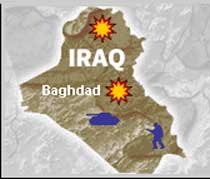 This week, the war in Iraq has brought both victories and hardships for those involved in these military operations, playing out both predicted and unexpected turns in events. Certainly, as this war continues to demonstrate, war is rarely a clean-cut affair no matter how much Americans and others on all sides may wish it so.
This week, the war in Iraq has brought both victories and hardships for those involved in these military operations, playing out both predicted and unexpected turns in events. Certainly, as this war continues to demonstrate, war is rarely a clean-cut affair no matter how much Americans and others on all sides may wish it so.
A force's performance in war relies on the blending of both art and science to develop military prowess that, overall, surpasses that of one's enemy. Essentially, the science of war is about weapons technology, while the art of war relates to the experience and character of military personnel, particularly of the commanders in charge. After all, the commanders are the ones responsible for developing and implementing military strategy, as well as providing food, equipment, ongoing training, effective communications and a sense of solidarity to the troops under their command.
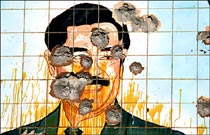 Likely, during the first week of the war, you heard a lot about the military's weapons and equipment, such as smart bombs and fighter jets. Last week's efforts and news coverage, however, highlighted more of the artful side of war.
Likely, during the first week of the war, you heard a lot about the military's weapons and equipment, such as smart bombs and fighter jets. Last week's efforts and news coverage, however, highlighted more of the artful side of war.
In this week's lesson, you'll examine the art of war, and then take a look at how it influenced the 1991 Gulf War, focusing specifically on the viewpoints of some of the war's leaders.
The Art of War
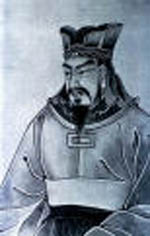 Interestingly, a 2,500-year-old Chinese general, referred to as Sun Tzu, maintains tremendous influence over American military operations. In fact, this ancient commander's book of military strategy titled, The Art of War, was cited recently in Harlan Ullman's document on Shock and Awe, the Pentagon document interpreted as the official handbook to this conflict.
Interestingly, a 2,500-year-old Chinese general, referred to as Sun Tzu, maintains tremendous influence over American military operations. In fact, this ancient commander's book of military strategy titled, The Art of War, was cited recently in Harlan Ullman's document on Shock and Awe, the Pentagon document interpreted as the official handbook to this conflict.
Furthermore, when U.S. General Tommy Franks was asked recently to estimate enemy forces, he replied, "The answer I'm going to give you will not be a number, because, as has been the case since Sun Tzu said it, precise knowledge of self and precise knowledge of the threat leads to victory."
So what do today's generals find so compelling about Sun Tzu's teachings? Start your investigation at The Art of War, Sonshi's online version of Sun Tzu's book. Begin by reading the Introduction, then continue through the 13 chapter pages using the forward arrow at the bottom of each page. Click on any of the ? at the end of some of the sentences to read people's interpretations of these statements.
In the Calculations chapter, what are the five factors, and how do they relate to the current war efforts? What does the Doing Battle chapter say about protracted war? What are the individual actions that can collectively defeat an enemy? In what ways does Planning Attacks and Force relate to how the U.S. has been fighting the war with Iraq?
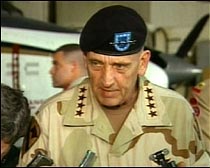 What does the coalition seem to know and not know about its enemy, and how does that affect its strategy? How do these principles relate to how Iraq has been fighting coalition forces? What tactics have been common and uncommon, and how has each side reacted to those tactics?
What does the coalition seem to know and not know about its enemy, and how does that affect its strategy? How do these principles relate to how Iraq has been fighting coalition forces? What tactics have been common and uncommon, and how has each side reacted to those tactics?
Continue reading through the chapters, from Weakness and Strength to Armed Struggle to Ground Formation to the final chapter, Using Spies. In what ways are the generals critical to victory? What kinds of behaviors -- from their enemies as well as from their own soldiers -- should they be wary and watchful of? What are the Nine Grounds, and which type are we fighting on?
A Case Study: The Gulf War, 1991
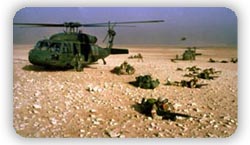 Getting a sense of overall strategy can be difficult when still engaged in conflict. So to get a better understanding of how the art of war has played its part in previous conflicts, explore The Gulf War, 1990-1991. Here, you'll learn about this war from the viewpoints of two sets of players, the Decision Makers and the Commanders.
Getting a sense of overall strategy can be difficult when still engaged in conflict. So to get a better understanding of how the art of war has played its part in previous conflicts, explore The Gulf War, 1990-1991. Here, you'll learn about this war from the viewpoints of two sets of players, the Decision Makers and the Commanders.
Review the thoughts of The Decision Makers, beginning with the Chairman of the Joint Chiefs-of-Staff Colin Powell and Secretary of Defense Dick Cheney, two men who continue to hold high ranking positions in the American government. What were their roles in analyzing, developing and implementing diplomatic and military efforts in the Gulf at that time? What were some of the critical decisions they made and what influenced them?
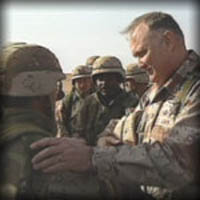 Also read about Secretary of State James Baker, National Security Advisor Brent Scowcroft. What were their views on Saddam Hussein and his invasion of Kuwait? How did these decision makers perform their various duties as diplomatic commanders?
Also read about Secretary of State James Baker, National Security Advisor Brent Scowcroft. What were their views on Saddam Hussein and his invasion of Kuwait? How did these decision makers perform their various duties as diplomatic commanders?
Now read about this war's Commanders, beginning with Norman Schwarzkopf, Commander-in-Chief of Central Command. What military and diplomatic events led up to this war? How exactly did he respond to Iraqi movements? What was the quality of intelligence the general had available? How was strategy developed and what factors influenced their course of action?
But, of course, Stormin' Norman wasn't the only commander in the Gulf War, so also check out the viewpoints of Lieutenant General Calvin Waller, General Charles Horner, General Walt Boomer, and any the other three commanders, if you have time. How did Waller help Schwarzkopf in sustaining troop morale? How did the others contribute to American military efforts? What did these commanders know and not know about the Iraqi military and Saddam Hussein's objectives? In what ways did that affect their strategic plans and the safety of their troops? How were their individual roles and perspectives different from each other?
Newspaper Activities
In a current issue of Targetnewspaper, find articles that relate to the art of war. Stories may reveal military strategies of coalition or Iraqi forces, or maybe they highlight the actions or statements of one of the major military commanders, such as Secretary of Defense Donald Rumsfeld or General Tommy Franks. How does the military's actions reflect or not reflect The Art of War principles outlined by Sun Tzu? In what ways are the commanders doing their job well? Can you identify any ways certain commanders could improve their own performance or that of the troops under their command?
© Copyright 2002
Learners Online, Inc.
